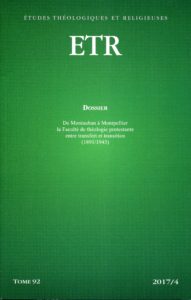À la fin du xixe siècle, et au début du xxe, un mouvement anticlérical et laïc s’appuie sur la science et la psychologie scientifique en plein essor pour lutter contre des croyances, des superstitions et la foi, en les réduisant à des processus psycho pathologiques. La Faculté de théologie protestante de Montauban réagit en recrutant des enseignants-chercheurs réputés pour leurs compétences interdisciplinaires, notamment Franz Leenhardt et ensuite le Dr Louis Perrier, diplômé de la Faculté des sciences et de médecine de Montpellier, mais aussi de la Faculté de théologie de Montauban dont Gérard Pithon analyse ici les travaux. Spécialisé dans les troubles obsessionnels compulsifs, à caractère religieux en particulier, Louis Perrier a contribué au développement d’un courant de recherches sur le sentiment religieux impulsé par Henri Bois. Il a œuvré pour le transfert de la Faculté de théologie de Montauban à Montpellier. Ses engagements d’enseignant, de chercheur et de médecin visaient à promouvoir la démarche scientifique contre l’obscurantisme et les fanatismes, à défendre avant l’heure la symbiose éco-systémique de l’homme dans son environnement, notamment en pays cévenol. À la fin de sa carrière, il semble s’investir davantage dans des recherches appliquées à l’éducation et à la pédagogie, où la nature et sa préservation doivent jouer un rôle important pour responsabiliser les jeunes au devenir de l’humanité.
At the end of the 19th century, and at the beginning of the 20th, an anti-clerical and secular movement relies on science and scientific psychology, booming at that time, to fight against beliefs, superstitions and faith, reducing them to psycho-pathological processes. The Faculty of Protestant Theology of Montauban reacts by recruiting research teachers renowned for their interdisciplinary skills, including Franz Leenhardt and then Dr Louis Perrier, a graduate of the Faculty of Science and Medicine of Montpellier, but also of the Faculty of Theology of Montauban. Specialized in obsessive-compulsive disorders, especially religious, he contributed to the development of research on religious feelings, following Henri Bois. He worked for the transfer of the faculty of theology from Montauban to Montpellier. His commitments as a teacher, researcher and doctor were aimed at promoting the scientific approach against obscurantism and fanaticism, he was a pioneer in defending the ecosystemic symbiosis of man in his environment, notably in the Cevenol country. At the end of his career, he seems to be investing more in research applied to education and pedagogy, where nature and its preservation must play an important role in empowering young people to the future of humanity.
p. 787-810
Auteur
PITHON Gérard
Gérard Pithon est maître de conférences honoraire de psychologie à l’Université Paul-Valéry Montpellier 3 et membre associé d’Epsylon (Dynamique des capacités humaines et des conduites de santé – EA 4556).
